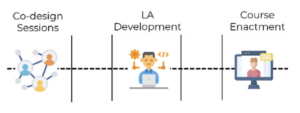Investigadoras del grupo de investigación GSIC-EMIC y del grupo de investigación GHIA han colaborado en el artículo recientemente publicado que presenta un estudio enfocado en optimizar la retroalimentación personalizada (feedback) y oportuna en los cursos en línea masivos y abiertos (MOOCs), mediante el uso de la analítica del aprendizaje (Learning Analytics) para implementar intervenciones escalables.
El estudio subraya la relevancia de un enfoque centrado en el ser humano, donde un instructor y un desarrollador de herramientas utilizaron un marco conceptual, llamado FeeD4Mi, para crear retroalimentación personalizada basada en Análisis de Aprendizaje (LA) en un MOOC.
Este estudio sigue un enfoque cualitativo interpretativo para comprender cómo el marco conceptual FeeD4Mi ayudó al instructor del MOOC a diseñar intervenciones de retroalimentación y al desarrollador de la herramienta a rediseñar una herramienta de LA existente llamada edX-LIMS.
Los resultados mostraron que las mejoras incorporadas en el rediseño de edX-LIMS facilitaron al instructor monitorear y asistir a los estudiantes con dificultades en el MOOC de manera oportuna. A pesar de que el proceso de diseño de retroalimentación se percibió como demandante en cuanto a tiempo, se planea abordar este problema en investigaciones futuras. Este estudio promueve enfoques participativos para el diseño, entrega y evaluación de intervenciones de retroalimentación informadas por LA en contextos reales.

Referencia:
Topali, P., Cobos, R. Agirre-Uribarren, U., Martínez-Monés, A., Villagrá-Sobrino, S. (2024) ‘Instructor in action’: Co-design and evaluation of human-centred LA-informed feedback in MOOCs. Journal of Computer Assisted Learning, 1-18. https://onlinelibrary.wiley.com/doi/10.1111/jcal.13057
Abstract:
Background: Personalised and timely feedback in massive open online courses (MOOCs) is hindered due to the large scale and diverse needs of learners. Learning analytics (LA) can support scalable interventions, however they often lack pedagogical and contextual grounding. Previous research claimed that a human- centred approach in the design of LA solutions can be beneficial. Yet, there is a scarcity of empirical studies discussing participatory approaches addressing LA for feedback in MOOCs.
Paper Objectives: We report a human-centred design, where an instructor and a tool developer employed a conceptual framework, named FeeD4Mi, to shape personalized LA-informed feedback in a MOOC.
Methods: The current study follows a qualitative interpretative approach to understand how the proposed conceptual framework FeeD4Mi served the MOOC instructor and the tool developer to design feedback interventions and re-design an existing LA tool, respectively.
Results and Conclusions: The results showed that FeeD4Mi helped the tool developer to create a contextualised LA tool, named edX-LIMS+. edX-LIMS+ allowed the instructor to monitor and assist struggling MOOC learners in a timely manner. Additionally, FeeD4Mi successfully guided the course instructor in designing and delivering personalised interventions. Yet, the feedback design process was perceived as time-demanding, an issue we plan to address in our future work. Takeaways: The current study extends the existing empirical about employing human-centred approaches for the design of LA-driven interventions. Moreover, this study advances the theory of scalable feedback tactics, through a conceptual framework that aims to guide MOOC instructors during the definition of feedback interventions. We envision that this research contributes to promoting participatory approaches for designing, delivering, and evaluating LA-informed feedback interventions in authentic contexts.
